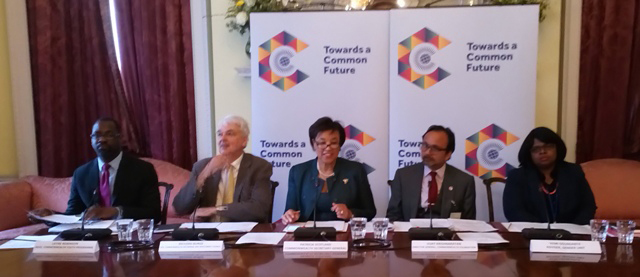 Commonwealth Secretary-General: Summit focus on “people, planet, prosperity, peace and partnership”.
Commonwealth Secretary-General: Summit focus on “people, planet, prosperity, peace and partnership”.
In a media briefing book-ended by questions about the succession to the Headship of the Commonwealth and Brexit, Commonwealth Secretary-General Patricia Scotland presented her team, an outline of her two-year restructuring of the Secretariat and her hopes for April’s Commonwealth Heads of Government Meeting (CHOGM) taking place in London.
Secretary-General Scotland opened the briefing days after Commonwealth Day. She described April’s summit as a “unique opportunity” for direct talks between 53 countries in what she called a “network of networks”.
The priorities were outlined by division leaders at the London-based Commonwealth headquarters at Marlborough House, which has seen significant staff turnover since she took office in April 2016.
The Secretary-General described the “reforms” as bringing the Commonwealth Secretariat (known informally as ComSec) to a “joined-up delivery structure after streamlining based on what Commonwealth heads of government had asked for them to lead on”.
She said that the focus of ComSec as it prepared for the April Summit and the UK becoming the chair-in-office for the next two years would be on “people, planet, prosperity, peace and partnership”.
Why the Commonwealth?
UK media attention that week had been on the Headship of the Commonwealth after Queen Elizabeth. However, speaker after speaker at the briefing tried to bring the agenda back to their work and why the Commonwealth was still important today.
“Some say if we hadn’t got the Commonwealth, we would probably have to create it,” Secretary-General Scotland said.
Presentations were made by the directors of ComSec’s key divisions. For those interested in ComSec Kremlinology, this is the current divisional structure, announced in October 2017.
Commonwealth Foundation Director Vijay Krishnarayan spoke about “increasingly bringing stakeholders to talk to one another” and Kemi Ogunsanya of the Gender Unit talked about providing opportunities for government officials to “listen” to the perspective of women.
Much emphasis was placed on the bottom-up approach to the single-venue forums for business, civil society (people) , women and youth to be held in London between 16-18 April, making Commonwealth Week more joined-up, rather than a series of parallel meetings.
ComSec’s top issues
Katalaina Sapolu, the Commonwealth’s Director of Governance and Peace, updated journalists on the establishment of corruption units in Africa and the Caribbean to help countries with the recovery of stolen assets, provide specialist legal advice online for legal officers around the Commonwealth and help to keep them abreast of anti-corruption reform. This was all part of the “distinctive advantage of the Commonwealth,” Ms Sapolu told the briefing.
On trade, Director Paulo Kautoke highlighted a review of intra-Commonwealth trade, support for member states on mineral resource finds, help with maritime boundaries based on shared experiences and work on the “Commonwealth advantage” in its Blue Charter work of applying the principles and values of the Commonwealth Charter to ocean governance.
Economic, Youth & Sustainable Development Director, Professor Prajapati Trivedi, spoke of “demand-driven” work by young people who wanted to see CHOGM and its plans “work on the ground”, getting member states to implement the SDGs more quickly and tackling governance in sports, which was due to be discussed at the sports ministers’ meeting on the sidelines of the Commonwealth Games.
The Brexit elephant in the Commonwealth room and the growing global trade war backdrop were tackled by the CEO of the Commonwealth Enterprise and Investment Council (CWEIC), Richard Burge. He outlined the “advantage of the Commonwealth” as a network at a time when there are “disruptive elements” in global trade.
The media’s top issues
The packed room of journalists from UK and Commonwealth media outlets asked a few questions around the ComSec agenda. However, the questioning focused on the topics in the newspapers during the week – succession and Brexit.
The Secretary-General’s responses to the various versions of the succession question remained the same: “I have nothing to say at this time”/ “You’ll be surprised to know I have nothing to say on that…it is a matter for the 53 heads of government”.
To a question on Prince Harry’s fiancée Meghan Markle’s involvement in the Commonwealth and Zimbabwe’s possible return to the Commonwealth, Baroness Scotland said on Zimbabwe: “the Commonwealth made it clear that the door was always going to be open”, while explaining that there had been no re-application letter as yet. She had “nothing to say” on Meghan Markle.
On Brexit, Secretary-General Scotland and her team had a positive perspective. She said “We’re looking for the opportunities, accepting where we really are….we have the potential for a trillion dollars worth of investment and trade…there are huge opportunities.”
She said that people were “re-awakening” to something they had had for a long time. CWEIC’s Richard Burge added that the emphasis would be on the “opportunities out of these changes” and “how do we double the pluses and lessen the minuses”.
Youth focus
Youth programme leader Layne Robinson announced the launch of a UK Youth Roadshow to “take the Commonwealth to them [young people]”. Youth leaders will be elected by their peers to monitor what he called “tangible, practical actions” over the next two years. Plans include a Youth Forum where the Commonwealth Young Person of the Year will be chosen, accompanied by a Global Citizens Concert.
As the youth plans seemed to get the ComSec message back on track, the final question of the briefing brought the room back to the UK newspaper focus – Was the choice of the successor to the Queen as Head of the Commonwealth a secret process?
A very patient Secretary-General Scotland answered “I am the servant of the 53 heads of government…when they are willing to tell me, I will be willing to tell you.”



